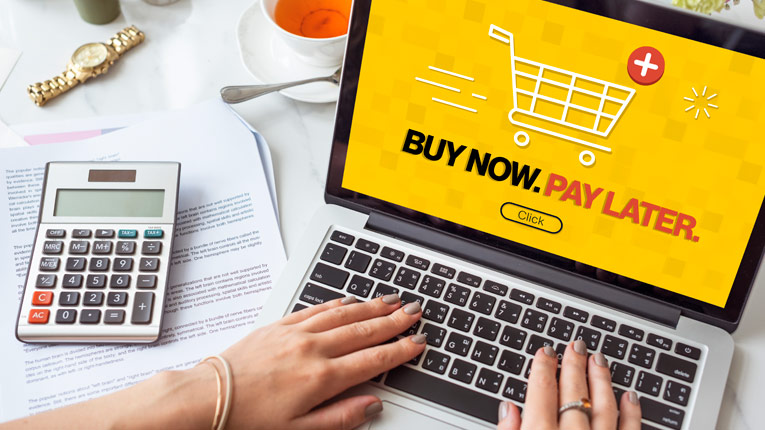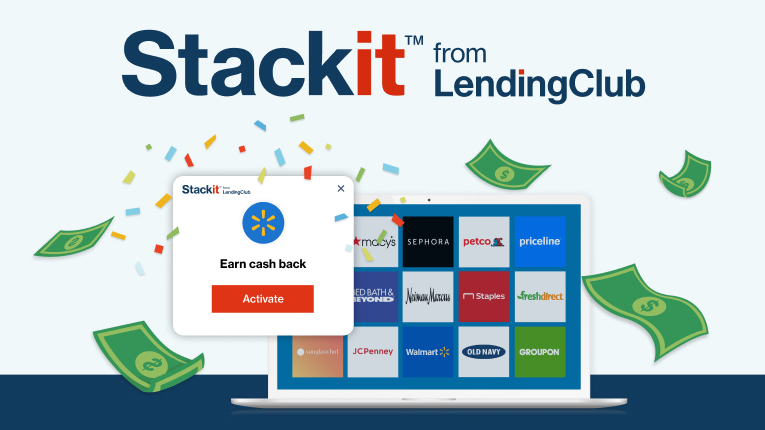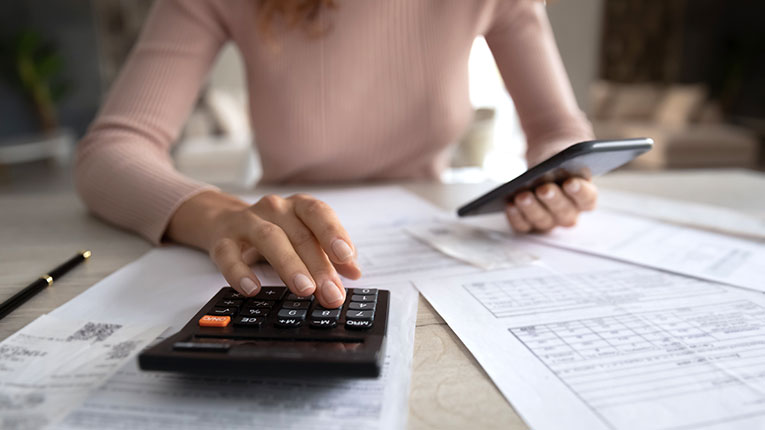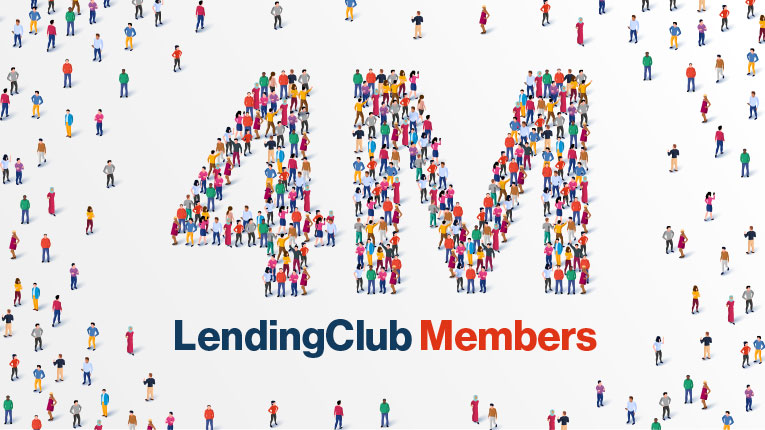What Is Buy Now, Pay Later?

The popularity of buy now, pay later (BNPL) loans among a certain segment of shoppers has exploded over the last several years. From 2019 to 2021, the number of loans originated by major BNPL providers grew by a massive 970%. Wherever you check out online, it’s now common to see the buy now, pay later payment option — but should you use it? While BNPL loans are often interest-free and easy to qualify for, they can come with potential risks. Read on to learn what BNPL is, how it works, and alternatives for borrowing money.
What Is Buy Now, Pay Later?
Buy now, pay later is a form of short-term consumer financing that lets you pay for purchases in installments, often with no interest. BNPL loans are sometimes referred to as “pay-in-four” and “point-of-sale” installment loans because plans typically have four equal payments, and often used to finance small online retail purchases.
The average amount financed by a BNPL loan was $135 in 2021, according to Consumer Financial Protection Bureau (CFPB) data. Consumers commonly use BNPL services to buy beauty products and apparel; however, some shoppers have started using BNPL services to pay for everyday items like gas, food and groceries. Examples of BNPL service providers include Klarna, Afterpay, and Affirm.
How Does Buy Now, Pay Later Work?
BNPL plans provide short-term retail financing by fronting merchants cash to cover your purchase and allowing you pay off that purchase in installments later. A common payment plan is known as pay-in-four, where the purchase is broken up into four equal installments. Typically, the first payment is due immediately, followed by three additional payments spaced two weeks apart.
BNPL companies often charge no interest or finance fees on “pay-in-four” BNPL plans if you pay on time. However, should you pay late or one of your payments is declined, it could trigger extra fees. Aside from the pay-in-four option, BNPL loans may offer other payment plans like “pay-in-30” or long-term financing over several months. These extended payment arrangements may come with interest, so it’s important you read the terms to understand exactly what you’re getting into.
The BNPL application process varies. Some BNPL providers have no credit check, so if you have poor credit, you could still qualify. Others do a soft credit check that doesn’t affect your score. For long-term installment options, a hard inquiry may be required, and that credit check could impact your score.
What Are the Risks of Using Buy Now, Pay Later?
BNPL is easy to sign up for and usually interest-free, however, it’s a loan, and loans add another financial obligation to your budget. If you rely heavily on BNPL to make your retail purchases, it could cause you to accumulate multiple payment plans that become too difficult to manage. If you start missing payment due dates, it could lead to costly late fees. And if payments for BNPL plans overdraft your bank account, your financial institution could even charge you overdraft or non-sufficient funds fees.
Falling behind on BNPL payments could affect your credit score and history in some circumstances. While these accounts are not generally reported to credit bureaus, BNPL companies can report your unpaid balance to a credit reporting agency or send you to collections. If a collections account shows up on your credit report, it can impact your ability to qualify for future loans and credit.
Pros and Cons: Buy Now, Pay Later
If you’re thinking about using BNPL for upcoming purchases, here are some benefits and drawbacks worth considering:
Pros | Cons |
|---|---|
Typically, BNPL plans have no interest or financing fees, so it’s like borrowing money for free (assuming you make all your payments on time and in full). | If your payment is late or the payment overdraws from your bank account, you could get hit with late fees from the BNPL company, and/or additional fees from your bank. |
Applying online is usually quick; instant approvals for online purchases are common. | Interest may be charged on longer-term financing plans. |
Some plans don’t require a credit inquiry; those that do may require only a soft credit check. | Unpaid BNPL debt could be sent to collections, which can negatively affect your credit history and score. |
Payment plans can be used for in-store or online purchases. | Managing and tracking multiple payment plans could quickly lead to becoming overextended financially. |
Who Should Consider Using Buy Now, Pay Later?
BNPL loans could be a good fit for one-off purchases you prefer not to pay for outright and only when you can comfortably afford the payments. If you use BNPL sparingly and always pay on time, you can avoid some of its dangers while enjoying the benefits, such as potentially interest-free payments.
Alternatives to Buy Now, Pay Later
BNPL plans aren’t always the best way to finance your online purchase. Depending on how much you need to borrow and for how long, below are three other options to consider instead of BNPL.
Credit cards
Credit cards offer a credit line with a limit you can use to make purchases and pay off the purchase on a revolving basis. While credit cards typically come with a higher, variable interest rate, you can avoid interest charges altogether if you pay off your balance in full at the end of the statement period.
Some credit cards also offer 0% APR introductory specials where you pay no interest for a certain period, such as 12 months. When making a big purchase — like a new sofa or back-to-school shopping haul — using a credit card with a no-interest special could be a way to charge the purchase and pay it off over several months for free.
Small personal loans
A personal loan offers a cash lump sum you can use to consolidate high-interest debt or make large purchases, such as home repairs or improvements. Personal loans carry interest charges, and depending on the loan terms, usually have fixed monthly payments that can last for several years. A hard credit inquiry is typically performed when you apply for a personal loan. Having a credit score of 670 or higher may be necessary to qualify. However, an even stronger credit score of 740 or higher could help you get approved for lower interest rates.
Cash
If a purchase isn’t an emergency, you could wait and save up for it rather than borrowing money. Start by coming up with a dollar amount you want to save, and then break that large number into manageable weekly and monthly savings goals. Saving in cash doesn’t get you items in hand right away, but it can help you avoid incurring a new debt balance and payment.
The Bottom Line
The ease with which you can sign up for BNPL can make it tempting to overspend and become financially overextended quickly. If you have the cash to make a purchase instead, paying in full at the point of sale is best. While many BNPL plans are typically interest-free, late fees can rack up if plans become unmanageable and you wind up paying late. Unpaid BNPL debt could also show up on your credit report and impact on your credit score if the balance remains unpaid or is sent to collections. If you’re struggling to pay bills or build savings, it’s best not to use BNPL since a new payment could put a strain on an already tight budget.
Buy Now, Pay Later FAQs
Below are a few quick facts about buy now, pay later loans:
What apps let you buy now, pay later?
Affirm, Afterpay, Klarna, and PayPal are examples of companies with apps offering BNPL loans.
Does buy now, pay later affect your credit?
Most BNPL companies charge late fees if you don’t pay off your balance in full by the due date, and your account may be frozen to prevent you from making any further purchases. If your unpaid balance is turned over to a collection agency, your collections account may be reported to the credit bureaus, which may impact your credit score.
What is the interest rate on a buy now, pay later loan?
Typically, pay-in-four plans are interest-free, but if you get long-term financing with a BNPL company that lasts several months, your loan may be charged interest. Some longer-term loans with BNPL companies may charge rates as high as 36% APR.
Does buy now, pay later build credit?
BNPL plans won’t help you build credit history because BNPL companies usually do not report accounts and payments to the credit bureaus. In some cases, BNPL could harm your credit history because unpaid balances can be sent to collections, which can hurt your credit score. That’s why it’s important to only take on payment plans you can manage and pay off your short-term loan in full.
You May Also Like












